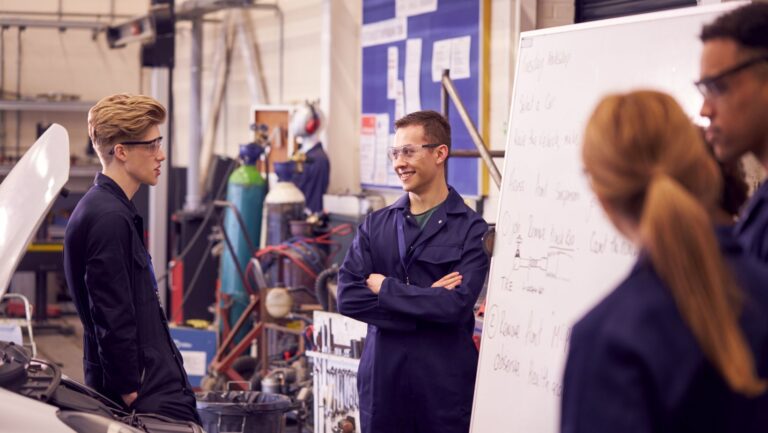Vocational Qualifications – From Apprenticeships to BTECs
If you’re a more practical based learner or you have a set career goal in mind, vocational qualifications are probably your best choice after GCSEs. From apprenticeships to BTECs, there’s a whole host of choices for Level 3 study (that’s one up from GCSEs which are a Level 2) that involve a mix of classroom learning, practical assessment, work experience and coursework.
So how to decide what type of VTQ (vocational technical qualification) is right for you? You’ll need to think about how you like to learn (classroom or practical), where you’d like to study (at college, in the workplace or a mix of the two), and how you prefer to be assessed (coursework or practical).
Most vocational routes will involve some form of work experience so they’re really popular with employers as you come out with both qualifications and the skills needed for a particular job. Whether you choose BTECs, NVQs, Apprenticeships or a combination of qualifications, they can all lead on to further study, employment or University if you wish.
Choosing to study Apprenticeships
An Apprenticeship is a work-based programme where you complete 80% of your time in a job / with an employer completing a paid placement, and the remaining 20% of your time studying (either in the workplace, remotely or at college).
To apply for an apprenticeship, you’ll need to have completed a Level 2 qualification. Employers usually ask for 4 or 5 GCSE passes (Grades 9-4 or A*C), including Maths and English. The most popular sectors for today’s modern apprenticeships include Business, Administration and Law, Health, Public Services and Care, Retail and Commercial Enterprise, Engineering and Manufacturing Technologies, and Construction, Planning and the Built Environment.
Once you’ve completed an Apprenticeship at Level 3, you can go on to study at Level 4 (Higher Apprenticeship equivalent to a Foundation Degree) through to a Level 7 (Degree Apprenticeship equivalent to a Master’s).
We asked Apprentices in Stockport to share their experience on what advice they’d give to young people choosing to study an apprenticeship. Here’s what they had to say.
Choosing to study BTECs, NVQs or other Vocational Qualifications
Business and Technology Education Council Qualifications (BTEcs) are a hands-on qualification which you can study along with GCSEs and A-Levels or equivalents, or as a standalone course. They are assessed by regular coursework and work experience, making them a flexible option for those who don’t perform well in exam scenarios. They’re becoming more popular than A-Levels in many subject areas and are popular with employers due to the hands-on skills you develop.
Similarly, National Vocational Qualifications (NVQs) are a great choice for those who want to combine working and learning. They are based on national occupational standards for each career sector (that is, list of skills and knowledge that employers say you need to work in a particular sector).
We asked local students in Stockport why they choose the BTEC route and here’s what they had to say.
Useful resources for Teachers and Schools
As part of 16+ Careers Week, we’ve produced some useful resources for teachers, careers advisors, schools and colleges, to help provide young people with a greater understanding of the key things to consider when studying vocational qualifications like Apprenticeships or BTECs.









